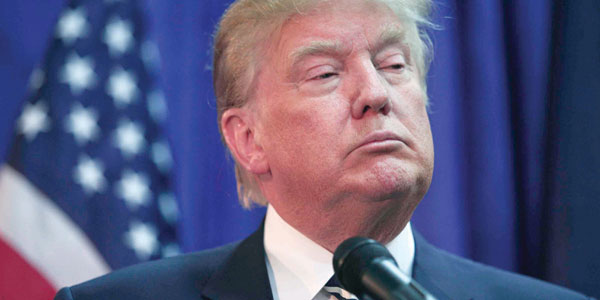
Nadie me lo contó. Yo lo viví. Primero Donald Trump me dijo, “Regrésate a Univisión” — que son palabras cargadas de odio — y pocos segundos después, tras haber sido expulsado de una conferencia de prensa en Iowa, uno de los seguidores de Trump me gritó: “Lárgate de mi país”.
Interesante su comentario porque, al igual que él y Trump, yo también tengo pasaporte de Estados Unidos. Estoy convencido que si Trump no me hubiera dicho nada, su simpatizante tampoco me habría gritado e invitado a salir de Estados Unidos. El odio es contagioso.
Desde que Trump lanzó su candidatura presidencial el 16 de junio del año pasado, he notado muchas muestras de odio en contra de inmigrantes en Twitter y Facebook. Cada vez que escribo un comentario, publico una columna o participo en una entrevista, mis cuentas se llenan de ofensas y groserías que no había escuchado en mis 33 años en Estados Unidos.
Trump ha creado un espacio que es el paraíso de los troles; y tanto activa como legitima los prejuicios de muchos estadounidenses. Esto se llama teoría de la activación. Lo aprendí de un magnífico artículo de Sanam Malik del Center for American Progress (aquí: ampr.gs/22zRzOD). “Cuando figuras públicas en posiciones de influencia promueven el odio, algo dañino ocurre”, escribió Malik. “Ellos legitiman conductas socialmente inaceptables, normalizan el odio y por lo tanto promueven la violencia”.
Primero fue Trump quien dijo una total falsedad: “Cuando México envía a su gente, no están enviando a los mejores … Ellos traen drogas. Ellos traen el crimen. Son violadores. Y algunos, supongo, son gente buena”. Y ahora muchos estadounidenses están repitiendo esas mentiras. (Sí, son mentiras: La gran mayoría de los inmigrantes mexicanos en Estados Unidos no son narcotraficantes, criminales o violadores.)
El mismo efecto negativo también podría ocurrir contra los musulmanes que viven en Estados Unidos. Trump llamó el 7 de diciembre por un “cierre total y completo a los musulmanes que quieran entrar a Estados Unidos.” En marzo de este año, dijo a CNN: “Creo que el Islam nos odia”.
Las palabras importan. Tienen consecuencias. Ese tipo de discursos sólo refuerza los estereotipos y prejuicios que algunos estadounidenses ya tienen contra los musulmanes.
En las consecuencias de los ataques terroristas en París, se triplicó el número de crímenes de odio en contra de musulmanes en Estados Unidos, con base en un análisis de la Universidad Estatal de California, en San Bernardino, citado en The New York Times.
Es muy peligroso cuando un candidato presidencial ataca a un grupo étnico — como Trump lo ha hecho en contra de inmigrantes mexicanos y en contra de musulmanes — porque sus seguidores pueden seguir su ejemplo o, peor, actuar con violencia contra ese grupo. Y no veo, por ahora, ninguna disminución en ese tipo de discursos.
Esta es una de las campañas presidenciales más divisivas y radicales que me ha tocado cubrir como periodista. Y si no hacemos bien nuestro trabajo, el riesgo para el país es enorme. Tenemos que hacer preguntas más duras a Trump, repetir más preguntas y retarlo constantemente. Hay que denunciar, y con fuerza, cualquier expresión de racismo y sexismo, venga de donde venga.
Como reporteros no podemos cometer los mismos errores que antes de la guerra en Irak en marzo del 2003. Debimos haber presionado mucho más al entonces presidente George W. Bush para que explicara dónde estaban las supuestas armas de destrucción masiva y para que hablara de sus planes después de la invasión de Irak. Miles de muertos después, todavía hoy estamos sufriendo los efectos de esa mala aventura militar y de nuestras pocas preguntas.
Igual ocurrió en Venezuela en 1998. Hugo Chávez ganó las elecciones presidenciales con muy poca resistencia de la prensa, gobernó como un caudillo y se atornilló en el poder hasta su muerte en 2013. El fenómeno mediático de Chávez en Venezuela tiene muchos puntos en común con el de Trump en Estados Unidos.
Trump — como el fallecido Chávez — está usando el odio para avanzar políticamente. Trump lo ha hecho contra inmigrantes mexicanos y musulmanes; Chávez lo hizo contra sus opositores políticos y todo aquel que no pensaba como él. Y una vez que el odio se contagia, es muy difícil sacarlo del corazón.
(Jorge Ramos, periodista ganador del Emmy, es el principal director de noticias de Univision Network. Ramos, nacido en México, es autor de nueve libros de grandes ventas, el más reciente de los cuales es “A Country for All: An Immigrant Manifesto”.)
________________________________________________________________________________________________________
Hate Is Contagious
By Jorge Ramos
I experienced firsthand how hate breeds hate. Last year, at a news conference in Iowa, when I tried to ask Donald Trump about immigration policy, he told me, “Go back to Univision” — hate-laden words. After Trump ejected me from the room, one of his supporters outside the hall yelled, “Get out of my country!”
I’m convinced that one reaction led to another. Had Trump not kicked me out so dismissively, his backer wouldn’t have felt compelled to order someone who is as American as he is to leave the country. Hate, after all, is contagious.
Since Trump launched his bid for the Republican presidential nomination last June, I’ve noticed that expressions of hate against immigrants on social media are becoming more common. Every time I offer an opinion, write a column or sit for an interview, my Twitter and Facebook accounts swarm with attacks and expletives. Their vehemence is unlike anything I’ve experienced in my 33 years in the United States.
It seems that Trump’s hateful rhetoric has created a safe space for trolls. His wrongheaded comments trigger and somehow sanction the prejudices of many Americans. This phenomenon is called the theory of activation, which I learned about in an excellent article written by Sanam Malik, a researcher at the Center for American Progress (read it here: ampr.gs/22zRzOD). “When public figures in influential positions appeal to hate, something particularly pernicious occurs,” Malik wrote. “They legitimize socially unacceptable behaviors and normalize hate, thereby encouraging violence.”
From the start, Trump legitimized contempt for undocumented immigrants. The day that he announced his candidacy, Trump famously declared, “When Mexico sends its people, they’re not sending their best … they’re bringing drugs. They’re bringing crime. They’re rapists. And some, I assume, are good people.” Months later, many Americans still echo Trump’s falsehoods. (And they are indeed falsehoods: An overwhelming majority of undocumented Mexican immigrants in the U.S. are not drug dealers, criminals or rapists.)
But Mexicans aren’t the only group that Trump has attacked. During the aftermath of the terrorist attacks in Paris last year, Trump called for a “total and complete shutdown of Muslims entering the United States.” Then, in a CNN interview in March, he said, “I think Islam hates us.”
There’s that word again — hate. We know that words matter. They have consequences.
In the aftermath of the terror attacks in Paris, the number of hate crimes against Muslims in the United States tripled, according to an analysis from California State University, San Bernardino, cited in The New York Times.
That’s why it’s incendiary for a presidential candidate to stoke fear against a particular group, as Trump has done with Mexican immigrants and Muslims. Who knows how many Trump partisans will follow his lead and repeat his rhetoric — or consider carrying out violent acts against a particular group? Sadly, I don’t see any decrease in that kind of speech.
Trump is conducting one of the most divisive campaigns I’ve ever covered as journalist. As we get closer to Election Day, we journalists must pose tougher questions and challenge Trump constantly. And we must denounce expressions of racism and sexism, wherever they originate.
We had better not repeat the same mistakes we made in the runup to the Iraq War in 2003. Journalists should have stepped up the pressure on President George W. Bush to reveal more information about Iraq’s supposed weapons of mass destruction. And we should have demanded that his administration state the plans for Iraq after the U.S. invasion. More than a decade later, after countless deaths in Iraq and throughout the region, we continue to see the effects of an ill-advised military adventure, partly enabled by a lack of journalistic oversight.
Something similar happened in Venezuela in 1998. That year, Hugo Chávez won the presidential election with very little resistance or questioning from the press. After his election, Chávez got hooked on power and ruled as a strongman until his death in 2013.
Like Trump, Chávez relied on hateful rhetoric to advance his political career. For Trump, it’s Mexican immigrants and Muslims, while Chávez targeted his political opponents and anybody who didn’t agree with him.
Trump is using hate to advance his campaign. It’s contagious, and very difficult to extricate from the heart.










